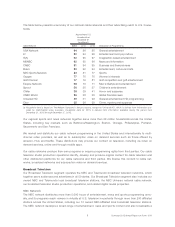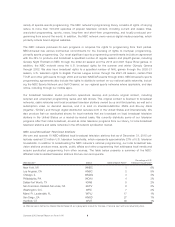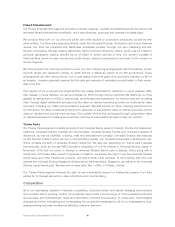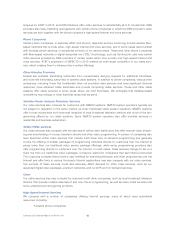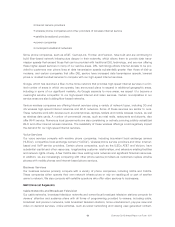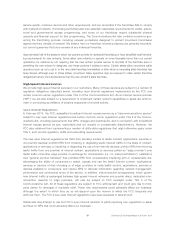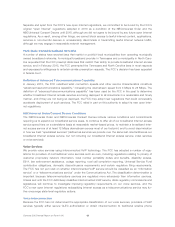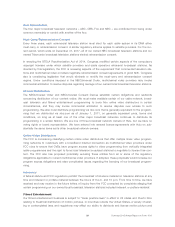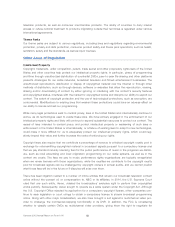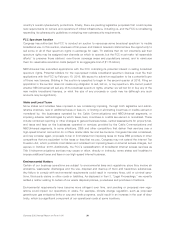Comcast 2015 Annual Report Download - page 20
Download and view the complete annual report
Please find page 20 of the 2015 Comcast annual report below. You can navigate through the pages in the report by either clicking on the pages listed below, or by using the keyword search tool below to find specific information within the annual report.service quality, customer service and other requirements, and are terminable if the franchisee fails to comply
with material provisions. Franchising authorities also may establish reasonable requirements for public, educa-
tional and governmental access programming, and some of our franchises require substantial channel
capacity and financial support for this programming. The Communications Act also contains provisions gov-
erning the franchising process, including renewal procedures designed to protect incumbent franchisees
against arbitrary denials of renewal. We believe that our franchise renewal prospects are generally favorable,
but cannot guarantee the future renewal of any individual franchise.
Approximately half of the states in which we operate provide for statewide franchising or have simplified local franchis-
ing requirements for new entrants. Some allow new entrants to operate on more favorable terms than our current
operations, for instance by not requiring that the new entrant provide service to all parts of the franchise area or
permitting the new entrant to designate only those portions it wishes to serve. Certain states allow incumbent cable
operators such as us to opt in to the new state franchise immediately or later when a competing state franchise has
been issued, although even in those states, incumbent cable operators may be required to retain certain franchise
obligations that are more burdensome than the new entrant’s state franchise.
High-Speed Internet Services
We provide high-speed Internet services to our customers. Many of these services are subject to a number of
regulatory obligations described below, including open Internet regulations implemented by the FCC and
certain common carrier regulations under Title II of the Communications Act. As an Internet service provider
(“ISP”), we are also subject to a requirement to implement certain network capabilities to assist law enforce-
ment in conducting surveillance of persons suspected of criminal activity.
Open Internet Regulations
In February 2015, the FCC reclassified broadband Internet access service as a “telecommunications service”
subject to new open Internet regulations and certain common carrier regulations under Title II of the Commu-
nications Act, including requirements that ISPs’ charges and practices for and in connection with broadband
Internet access service be just, reasonable and not unjustly or unreasonably discriminatory. However, the
FCC also refrained from implementing a number of utility-style regulations that might otherwise apply under
Title II, such as rate regulation, tariffs and unbundling requirements.
The new open Internet regulations bar ISPs from blocking access to lawful content, applications, services or
non-harmful devices; prohibit ISPs from impairing or degrading lawful Internet traffic on the basis of content,
applications or services, or impairing or degrading the use of non-harmful devices; prohibit ISPs from favoring
lawful traffic from one provider of Internet content, applications or services (called an “edge provider”) over
lawful traffic of another edge provider in exchange for consideration (i.e., no “paid prioritization”); establish a
new “general conduct standard” that prohibits ISPs from unreasonably interfering with or unreasonably dis-
advantaging the ability of consumers to select, access and use the lawful Internet content, applications,
services or devices of their choosing or of edge providers to make lawful content, applications, services or
devices available to consumers; and require ISPs to disclose information regarding network management,
performance and commercial terms of the service. In addition, interconnection arrangements, which govern
how Internet traffic is exchanged between high-speed Internet networks and provide direct, dedicated inter-
connection capacity to edge providers, will now be subject to FCC oversight under Title II of the
Communications Act. All of these regulations are subject to FCC enforcement and could give rise to third-
party claims for damages or equitable relief. These new requirements could adversely affect our business,
although the extent to which they do so will depend upon the manner in which the FCC interprets and
enforces them. The FCC’s new open Internet regulations have been appealed in federal court.
States also may attempt to use the FCC’s open Internet decision to justify imposing new regulations or taxes
and fees on ISPs that could adversely affect our business.
17 Comcast 2015 Annual Report on Form 10-K


